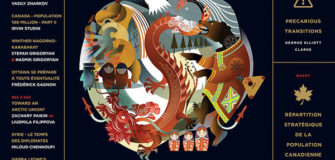Whither Canadian Intelligence?

 The former longtime head of CSIS meditates on the next decade of threats, challenges and imponderables
The former longtime head of CSIS meditates on the next decade of threats, challenges and imponderables
The head of any major intelligence agency can hardly look ahead a few months, let alone 10 years. And yet, quite evidently, successful intelligence requires foresight, planning and a future-oriented imagination. Unencumbered, therefore, by my former professional responsibilities, with the exception of any obligations I may have under Canada’s Security of Information Act, I can offer some reflections on key forward issues, pressures and opportunities for intelligence agencies in Canada.
To be sure, if one is to think about where Canadian intelligence and intelligence agencies are headed over the medium and long run, one must first identify where they have been. In Canada, intelligence as a subject or discipline, and intelligence agencies as institutions, have enjoyed a three decade-long period of general stability in legislative terms. Fairly little changed in the foundational CSIS Act from its inception in 1984 until 2015, when the ability of the Canadian Security Intelligence Service to operate outside of Canada was confirmed and the authority to take active measures to intervene beyond the simple reporting of intelligence were introduced into the legislation. Of course, these new provisions gave birth to controversy insofar as they were interpreted as allowing rights enshrined in the Canadian Charter of Rights and Freedoms to be overridden. This controversy has persisted to the present day.
Since the early 1980s, CSIS has faced real challenges in the form of national security threats from a variety of terrorist groups, including the Babbar Khalsa, the Tamil Tigers, and both Al Qaeda and ISIS – threats that have properly been prioritized by the Service over other responsibilities and pressures, such as counterintelligence. For its part, the Communications Security Establishment (CSEC), which only really came into legislative existence in 2001, after the attacks of 9/11, has made similar calculations in response to similar challenges. Indeed, CSEC remained relatively obscure to most Canadians until the revelation in 2013 of the information stolen by Edward Snowden.
Canadian agencies, like those elsewhere in the world, have seen substantial growth in size and in the requirement to develop the capabilities to respond to these threats – including movement away from a focus on counterintelligence to counter-terrorism, while anticipating and adapting to the major changes in communications technology over the last three decades. Importantly, these developments have been supported by considerable stability in Canada’s key allied relationships – a set of dynamics that have allowed Canadian agencies to move from being minor players during the Cold War, with little to offer but geography, to very capable players, able to make significant contributions. As such, the intelligence reach of both CSIS and CSEC has broadened substantially over the years – in some cases because of the nature of the targets being investigated, and in others due to the growth in capabilities and the concomitant expansion of their reputation in the world of intelligence – beyond the limits of Canada’s traditional close relationships with the US, the UK, Australia and New Zealand (the Five Eyes), as well as intelligence services in Europe, Asia, the Middle East, Africa and South America.
If this period has been one of growth for Canadian agencies, it has been similarly so for the agencies of countries that Canada and Western countries have traditionally regarded as adversaries. While some of these adversaries have continued to provide challenges – notably the counterintelligence challenges posed by the Russians and the Chinese (although many of the world’s intelligence agencies have also sought to operate in Canada, if only to the level of being a nuisance) – many of these same adversaries have also faced, and been considerably preoccupied by, the same terrorist challenges exercising Canadian and Western agencies – most notably from elements of Al Qaeda and ISIS.
While the agencies in countries such as Russia or China are often little constrained by formal legislative requirements, it is equally true that the consequences of having to respond to serious terrorist threats have been comparable in these countries, even as these agencies have continued to hone intelligence skills that Canada views as creating a counterintelligence challenge.
Unfortunately, all good things (and most bad things too) come to an end. For Western agencies, the first major sign of the challenges ahead was the damage done by the said revelations in 2013 of the information stolen by Edward Snowden. These revelations made clear the degree to which the US and some of its agencies had been operating certain collection programmes without full legislative authority. And yet, in an age where many confide ever-more private information to private corporations like Google and Facebook, one could argue that the many professions to surprise at these revelations were somewhat overdone – not least because such major corporations face little, if any, of the oversight or review to which most Western intelligence agencies are subject in respect of their collection activities.
The cumulative consequence of the Snowden leaks and the various associated reactions and counter-reactions has been a marked drop in the public’s trust in Western intelligence services – and this despite the fact that the agencies of most Western countries outside of the US, including those in Canada, had been operating within their legislative authority, with regular oversight and review. This trust deficit will be difficult to repair. In Canada, the transition from the Harper government to the Trudeau government saw the implementation of positions taken by Justin Trudeau in the run-up to the election that seem to have been calculated to respond to concerns about alleged intelligence overreach, but were otherwise largely uninformed by serious policy and operational knowledge of the relevant security and intelligence issues in their multiple dimensions. As a result of proposed new legislation, Canadian intelligence agencies now find themselves facing burdensome new review structures, including the new prime ministerial review committee comprised of Members of Parliament, which comes on top of review by the existing Security Intelligence Review Committee (SIRC) – a review regime that, by international standards, is already heavy.
As SIRC will also have increased responsibilities to review all elements of the Canadian intelligence community, this enhanced review architecture will likely double the review workload for CSIS, while adding a sizeable new load for bodies like the Canada Border Services Agency and parts of federal government departments with an intelligence function, but which have not to date been subject to review by SIRC. All of this takes place while many countries around the world – Western and non-Western alike, and evidently including the US – still face significant terrorist challenges, and with no additional funding for Canadian agencies.
If one adds to this emerging brew the Trumpian ideas about spheres of influence, it seems likely that US agencies will be much more demanding of, and far less forthcoming with, the agencies of other countries in the future. This will evidently present unique challenges for Canadian intelligence.
Canada’s strategy continues to work according to the general logic that, while protecting a Canadian target from an attack is a key role for Canadian agencies, protecting a target in the US from an attack emanating from, or originating in, Canada is equally important. However, in its response to this state of affairs, Canada seems to be unique among its traditional partners and the intelligence services with which Canadian agencies work around the world in imposing substantial new review workloads on already-stressed agencies without any proper rationalization of the proposed new review process in relation to the delivery of intelligence outcomes in a difficult threat environment.
To be sure, no adversarial agencies, all of which aggressively use their technological capabilities (e.g. the allegations of Russian interference in the 2016 American election), as well as more traditional techniques, find themselves challenged in any similar way. Moreover, we are living in a time in which the said strategic stability that has underpinned the operational success of Canadian agencies and Canadian security since WW2 is fast-changing. The US under President Trump no longer appears committed to, or supportive of, the Pax Americana. More broadly, the Trump administration appears to see the world in terms of more narrow spheres of influence – a posture that is very different from the world and ‘strategic game’ in which Canadian agencies have functioned to date.
For now, American intelligence agencies, notwithstanding the President’s apparent aversion to intelligence and the intelligence community, seem not to be particularly troubled (in professional terms) by the new administration – at least insofar as there have not, to date, been any problematic leaks beyond those in the early days of the Trump presidency in relation to the Russia ‘affair.’ If that is true, it is hard to imagine that the ‘America First’ strategy of the new administration will bother them a great deal. Indeed, this doctrine is, for all practical intents and purposes, their default setting. If one adds to this emerging brew the Trumpian ideas about spheres of influence, it seems likely that US agencies will be much more demanding of, and far less forthcoming with, the agencies of other countries in the future. This will evidently present unique challenges for Canadian intelligence.
So where, in terms of the future of Canadian intelligence agencies, does that leave the discussion? While it may be too early to forecast out to the end of the century, some things are relatively clear, given the reality of how often it is possible, politically, to deal with changes to security and intelligence legislation and policies regarding security and intelligence agencies. Domestically, the prognosis in Canada is not positive. The Trudeau government appears to be firmly wedded to its positions and has shown relatively little flexibility for manoeuvre (as demonstrated, albeit in a different policy sphere, by the decision to withdraw CF-18s from Iraq, even when there was, arguably, an opportunity for the government to change its position with relatively little political risk). This suggests that Canadian agencies are likely to be progressively weakened by policies that will impose greater burdens, while increasingly impairing their effectiveness. Of course, this state of affairs could be changed by a major terrorist attack in Canada. But such an attack, in historical terms, remains unlikely. This may be because Canada is simply too small a target for organizations like Al Qaeda or ISIS in a world of plentiful soft targets, or indeed for reasons having to do with Canada’s relative effectiveness among the nations in integrating immigrant and refugee communities into Canadian society – all of this perhaps in combination with more effective work by Canadian law enforcement and intelligence organizations in preventing such attacks.
The worry that will remain, of course, is the question of what would happen in the event of an attack in the US of Canadian provenance, or perceived Canadian provenance. Against the critical Canadian imperative to prevent such attacks, any impairment of the efficacy of Canadian agencies would appear to be short-sighted. Internationally, Canada’s situation or position is not much better. While it is not clear what the future holds for the Trump administration and therefore for its policies, the general policy posture, settings and momentum in the US are unlikely to change in any foreseeable future. This means that Canadian intelligence agencies will find themselves much more circumscribed – within an American ‘sphere of influence’ – than they have been in the past. Canada’s traditional security and intelligence partnerships are likely to remain important, although it is difficult to anticipate the effects on the UK agencies of any ‘hard’ Brexit and a very possible future Labour government led by Jeremy Corbyn. These effects could well be very serious (in the negative sense) for what has been an important relationship for Canada.
In respect of other relationships beyond the traditional ones, the reality is that the ability of Canadian agencies to maintain all of these relationships is likely to be increasingly circumscribed both because of reduced effectiveness and the new international strategic reality. While some may argue that Canada should, as a result, now embark on the creation of a new or enhanced foreign intelligence capacity, I still consider such a move ill-advised. It is not clear that Canada could truly make up any intelligence deficits on our own, and in any case all of the well-established arguments against such a major step are very real and remain apposite in the present circumstances.
Ward Elcock was Director of the Canadian Security Intelligence Service between 1994 and 2004.









